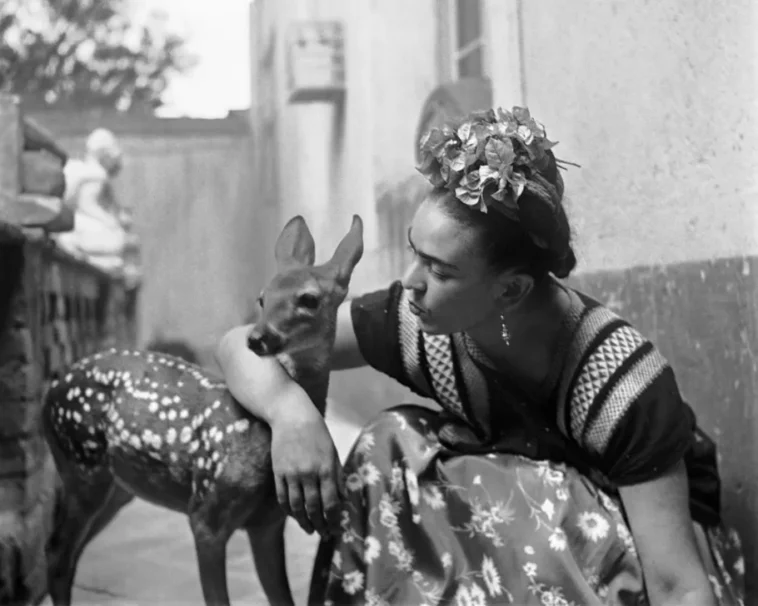Frida Kahlo, one of Mexico’s most iconic artists, was born on July 6, 1907. Her life and art have been extensively studied and celebrated worldwide. Despite the wealth of information about her, a notable mystery remains: no recordings of her voice are known to exist.
Frida Kahlo’s life was tumultuous, marked by physical suffering and emotional turmoil. She contracted polio at a young age, which left her with a limp, and later, a bus accident resulted in multiple fractures and lifelong health issues. Her art reflects her pain, resilience, and unique perspective on life and identity.
Although she lived in a time when recording technology was available, the lack of any known audio recordings of her voice is puzzling. She traveled to New York, Detroit, Paris, and many other places. No one seems to have recorded a single voice interview of Frida. Several theories attempt to explain this absence:
- Technological Limitations: During the early 20th century, audio recording technology was not as pervasive as it is today. While it was possible to make recordings, it was not a common practice for private individuals unless they were involved in radio or film.
- Personal Choice: Frida Kahlo might have chosen not to be recorded. She was known for her strong personality and could have preferred to maintain a certain mystique about herself.
- Lost Recordings: It is also possible that recordings of her voice did exist at one time but were lost or destroyed. Frida’s home, La Casa Azul, and her personal belongings have undergone many changes over the years, and valuable items could have been misplaced or damaged.
- Focus on Visual Art: Frida’s primary medium of expression was visual art. Her paintings are deeply personal and biographical, serving as the main conduit of her voice and thoughts. She might have felt that her paintings were the best representation of her inner world, making audio recordings unnecessary.
The False Alarm
In 2019, a recording emerged that was initially believed to possibly contain Frida Kahlo’s voice. The tape, found in Mexico’s National Sound Library (Fonoteca Nacional), features a woman reading an essay about Diego Rivera. The voice on the tape was described as “warm, pleasant, and animated.” However, further investigation revealed that the voice actually belonged to Amparo Garrido, an actress known for dubbing the voice of Snow White in the Spanish version of the Disney film. This revelation dashed hopes of finally hearing Frida Kahlo’s voice.
The intrigue surrounding Frida Kahlo’s voice adds another layer to her already fascinating legacy. It leaves admirers and scholars alike yearning for a more intimate connection with the artist beyond her visual masterpieces.
More on that false alarm.
In this article, her relatives indicate that Frida’s voice was “They told me that Frida Kahlo had a hoarse voice due to tobacco and alcohol… this voice seems very youthful to us ,”
El Misterio de la Voz de Frida Kahlo
Frida Kahlo, una de las artistas más icónicas de México, nació el 6 de julio de 1907. Su vida y obra han sido estudiadas y celebradas en todo el mundo. A pesar de la gran cantidad de información sobre ella, hay un misterio notable: no se conoce ninguna grabación de su voz.
La vida de Frida Kahlo fue tumultuosa, marcada por el sufrimiento físico y emocional. Contrajo polio a una edad temprana, lo que le dejó una cojera, y más tarde, un accidente de autobús le causó múltiples fracturas y problemas de salud de por vida. Su arte refleja su dolor, resiliencia y perspectiva única sobre la vida y la identidad.
Aunque vivió en una época en que la tecnología de grabación estaba disponible, la falta de grabaciones de su voz es desconcertante. Varias teorías intentan explicar esta ausencia:
- Limitaciones Tecnológicas: Durante principios del siglo XX, la tecnología de grabación no era tan común como hoy. Aunque era posible hacer grabaciones, no era una práctica habitual para individuos privados a menos que estuvieran involucrados en la radio o el cine.
- Elección Personal: Frida Kahlo podría haber elegido no ser grabada. Era conocida por su fuerte personalidad y podría haber preferido mantener un cierto misterio sobre sí misma.
- Grabaciones Perdidas: También es posible que existieran grabaciones de su voz en algún momento, pero se hayan perdido o destruido. La Casa Azul, su hogar, y sus pertenencias personales han pasado por muchos cambios a lo largo de los años, y objetos valiosos podrían haberse extraviado o dañado.
- Enfoque en el Arte Visual: El principal medio de expresión de Frida era el arte visual. Sus pinturas son profundamente personales y biográficas, sirviendo como el principal canal de su voz y pensamientos. Podría haber sentido que sus pinturas eran la mejor representación de su mundo interior, haciendo innecesarias las grabaciones de audio.
La Falsa Alarma
En 2019, surgió una grabación que se creía que podía contener la voz de Frida Kahlo. La cinta, encontrada en la Fonoteca Nacional de México, presenta a una mujer leyendo un ensayo sobre Diego Rivera. La voz en la cinta fue descrita como “cálida, agradable y animada”. Sin embargo, tras una investigación más profunda, se reveló que la voz pertenecía a Amparo Garrido, una actriz conocida por doblar la voz de Blancanieves en la versión en español de la película de Disney. Esta revelación apagó las esperanzas de finalmente escuchar la voz de Frida Kahlo.
El misterio que rodea la voz de Frida Kahlo añade otra capa a su ya fascinante legado. Deja a admiradores y estudiosos anhelando una conexión más íntima con la artista más allá de sus obras maestras visuales.




